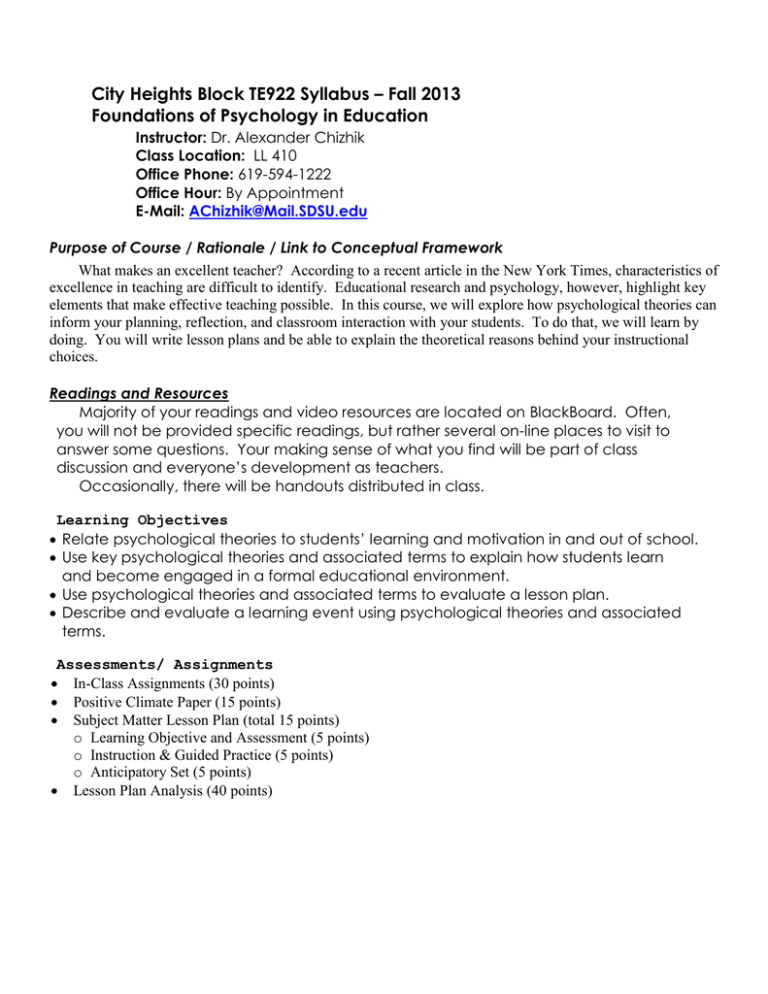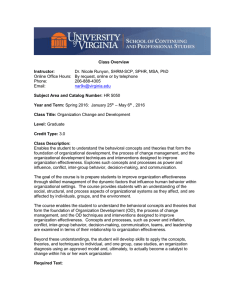City Heights Block TE922 Syllabus – Fall 2013
advertisement

City Heights Block TE922 Syllabus – Fall 2013 Foundations of Psychology in Education Instructor: Dr. Alexander Chizhik Class Location: LL 410 Office Phone: 619-594-1222 Office Hour: By Appointment E-Mail: AChizhik@Mail.SDSU.edu Purpose of Course / Rationale / Link to Conceptual Framework What makes an excellent teacher? According to a recent article in the New York Times, characteristics of excellence in teaching are difficult to identify. Educational research and psychology, however, highlight key elements that make effective teaching possible. In this course, we will explore how psychological theories can inform your planning, reflection, and classroom interaction with your students. To do that, we will learn by doing. You will write lesson plans and be able to explain the theoretical reasons behind your instructional choices. Readings and Resources Majority of your readings and video resources are located on BlackBoard. Often, you will not be provided specific readings, but rather several on-line places to visit to answer some questions. Your making sense of what you find will be part of class discussion and everyone’s development as teachers. Occasionally, there will be handouts distributed in class. Learning Objectives Relate psychological theories to students’ learning and motivation in and out of school. Use key psychological theories and associated terms to explain how students learn and become engaged in a formal educational environment. Use psychological theories and associated terms to evaluate a lesson plan. Describe and evaluate a learning event using psychological theories and associated terms. Assessments/ Assignments In-Class Assignments (30 points) Positive Climate Paper (15 points) Subject Matter Lesson Plan (total 15 points) o Learning Objective and Assessment (5 points) o Instruction & Guided Practice (5 points) o Anticipatory Set (5 points) Lesson Plan Analysis (40 points) Course Requirements Attendance, Participation, and In-Class Assignments (30 points) Attendance. Regular attendance is your professional responsibility and extremely important to learning with your colleagues. Please let me know in advance when you will be absent or anticipate being late. Participation. My teaching philosophy emphasizes a student-centered teaching approach that includes discussions, problem solving, and cooperative learning in class. The mantra for our class is learning by doing. It is important that you do engage in whole and small class discussion. In-Class Assignments. Preparing for each class by doing the appropriate readings/watchings will be important for active participation during class. In-class assignments will be a way of further constructing your understandings. These assignments will constitute 30 points of your grade. (2 points per session) Positive Climate Paper (15 Points) Please write a one-page paper identifying three routines that create a positive climate for your students. Use Deci and Ryan’s Self-Determination Theory as well as Dweck’s Mindset Theory to explain how each routine facilitates a positive climate for your students. As you write this paper, you must be sure to a) explain Self-Determination theory and its three components, b) explain Mindset theory, (c) apply the theories to each routine that you identified in your class, and d) list the references used. Subject Matter Group Lesson Plan (Total of 15 Points) During the course of the semester, you will work with your peers to develop a lesson plan for your specific area. You will submit portions of that lesson plan at specified times. Although you will work as a group to design the lesson plan, you will be responsible for interpreting that collective work on your own. Thus, each person will submit the lesson plan as he or she understands it. You will submit the following: 1. Learning Objectives and Assessment 2. Instruction and Guided Instruction 3. Anticipatory Set For each of the section, you must submit the reasoning behind that part of the lesson plan. Your reasoning must include: a. Explanation of relevant learning and motivational theories b. Explanation of how the relevant theories apply to your plan Lesson Plan Analysis (40 points) For this assignment, you must use a lesson plan that you have developed and, preferably, taught. Your task is to analyze and reflect on the decisions you made in the construction and implementation of your lesson. Your analysis should be supported with relevant theories from our course. Be sure that your selected lesson plan highlights the teaching of a new concept, strategy, or skill. You must submit all assignments through Blackboard. Submitting work electronically When an assignment must be submitted as an attachment, please take care to properly format your file so that your assignment is received appropriately. You must be sure to place your name on the upper right hand corner of your document as if you were turning in a hard copy. When saving/naming the file, you must place your name and the name of the assignment as the file name (e.g., SChizhikLearningObjectiveAssignment.doc). If you are communicating about an assignment through email, please place your name and the name of the assignment in the subject header. Grading Policy A: 100-94 points B: 89-80 points C: 79=70 points D: 69-60 points (A- : 90-93 points) (B- : 83-80 points) (C- : 73-70 points) (F: under 59) (B+ :89-86 points) (C+ : 79-76 points) Class Policies 1. All assignments must be submitted and are due as scheduled. If i choose to accept late work in extreme cases, expect your grade to be negatively affected. 2. If you have any concerns about class, please talk to me before or after class or make an appointment. I cannot help you unless you communicate with me. I am available to meet with you on a flexible schedule and am a kind, gentle, and likable person. Plagiarism Plagiarism is formal work publicly misrepresented as original; it is any activity wherein one person knowingly, directly, and for lucre, status, recognition, or any public gain resorts to the published or unpublished work of another in order to represent it as one’s own. Work shall be deemed plagiarism: (1) when prior work of another has been demonstrated as the accessible source; (2) when substantial or material parts of the source have been literally or evasively appropriated (substance denoting quantity; matter denoting qualitative format or style); and (3) when the work lacks sufficient or unequivocal citation so as to indicate or imply that the work was neither a copy nor an imitation. This definition comprises oral, written, and crafted pieces. In short, if one purports to present an original piece but copies ideas word for word or by paraphrase, those ideas should be duly noted. (Lindey, Alexander. Plagiarism and Originality, 1952) Course Calendar Week Date 1 8/29 2 9/5 3 9/12 4 9/19 5 9/26 6 10/3 7 10/10 8 10/17 9 10/24 10 10/31 (no class) 11 11/7 12 11/14 13 11/21 14 11/28 15 12/5 16 12/12 Class Discussion Assignments Due Introductions Class Overview Two Teachers; Two Stories; Many Lessons What’s Your Mindset? Get Back to the Place Where You Belong: Self-Determination I Can Do It Myself! Autonomy and Self-efficacy Writing Lesson Plans: An Overview Positive Climate Paper Due Bring 2 Versions of a Lesson Plan (original and your revision) Learning Objectives: The Guiding Light Intelligence for Success Multiple Intelligences Thinking through language… Interacting with others while thinking… How can a teacher intervene positively in thinking? Anticipatory Set Learning Objectives and Assessment Assignment Instruction and Guided Instruction Assignment Putting it all together into a lesson Thanksgiving Break Using assessment data to plan future lessons Finishing Touches Anticipatory Set Assignment



